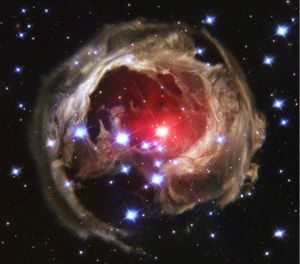Astronomy is
based on the laws of physics (and therefore mathematics) and aims at
describing what is happening to the universe based on what we observe
today. An example of this is weather forcasting:
Forecasting the weather does not come under the heading of astrology or claiming to have knowledge of the unseen, rather it is based on physical evidence and experience, and study of the natural laws established by Allaah. The same applies to knowing the times of solar and lunar eclipses, or when there are likely to be strong winds and rainfall.

Astrology on the other hand claims it can predict what will happen to individuals (or guess what is happening to them), or to mankind, based on such things as solar system configurations and birth dates. Common applications include horoscopes and such. Regardless of whether there is scientific support for astrology, its goal and methods are clearly distinct from those of astronomy.

Astronomy vs Astrology
Astronomy is the scientific study of the sun, moon, stars, universe etc while astrology is the study of movements and positions of stars and planets in the belief that they influence human behavior and destiny.
Forecasting the weather does not come under the heading of astrology or claiming to have knowledge of the unseen, rather it is based on physical evidence and experience, and study of the natural laws established by Allaah. The same applies to knowing the times of solar and lunar eclipses, or when there are likely to be strong winds and rainfall.

Astrology on the other hand claims it can predict what will happen to individuals (or guess what is happening to them), or to mankind, based on such things as solar system configurations and birth dates. Common applications include horoscopes and such. Regardless of whether there is scientific support for astrology, its goal and methods are clearly distinct from those of astronomy.

Astronomy vs Astrology
Astronomy is the scientific study of the sun, moon, stars, universe etc while astrology is the study of movements and positions of stars and planets in the belief that they influence human behavior and destiny.
Astrology includes several groups of
traditional systems basically classified as Eastern and Western ones
that use the position of the planets and stars at the time of an
individual’s birth to predict his future, personality, important events
of his life etc. Scientists often negate astrology claiming it has no
physical basis of proof.
Astrology and Astronomy came to be regarded separately only during the modern times as, in early history of mankind, science had not developed to the point where the quantifiable aspects of astronomy could be reasoned out clearly. The functioning of the stars and planets was a mystery to man till progress was made in scientific fields over the last hundred years. Science has now come to completely denounce astrology as a pseudo science though astrologers continue to swear by it.
Astrology and Astronomy came to be regarded separately only during the modern times as, in early history of mankind, science had not developed to the point where the quantifiable aspects of astronomy could be reasoned out clearly. The functioning of the stars and planets was a mystery to man till progress was made in scientific fields over the last hundred years. Science has now come to completely denounce astrology as a pseudo science though astrologers continue to swear by it.
Meanwhile, a more technical definition
of astronomy states that astrophysics covers the physical properties,
behavior and related dynamic processes or phenomena of celestial objects
including the earth while astronomy covers objects outside the earth’s atmosphere.
Astronomy is further classified as
Astronomy is further classified as
- Solar astronomy that covers the most important star in the planetary system ‘“ the sun.
- Planetary science that covers comets, planets, asteroids and other bodies that are orbiting the sun. This includes all extra-solar bodies too.
- Stellar astronomy that covers any planetary nebula and is the basis of the understanding of how the universe functions.
- Galactic & Inter-galactic astronomy that covers Milky Way ‘“ the galaxy our planetary system is in. There is not much known yet about the nearest galaxy to Milky Way ‘“ the Andromeda Galaxy.
- Physical Cosmology which studies the overall structure of the cosmos that comprises several galaxies.
Ironically, astrology and astronomy are
two sciences in which amateur practitioners have contributed the most
than in any other fields of human endeavor!









1 comments:
hi just registered ,, tina
Post a Comment